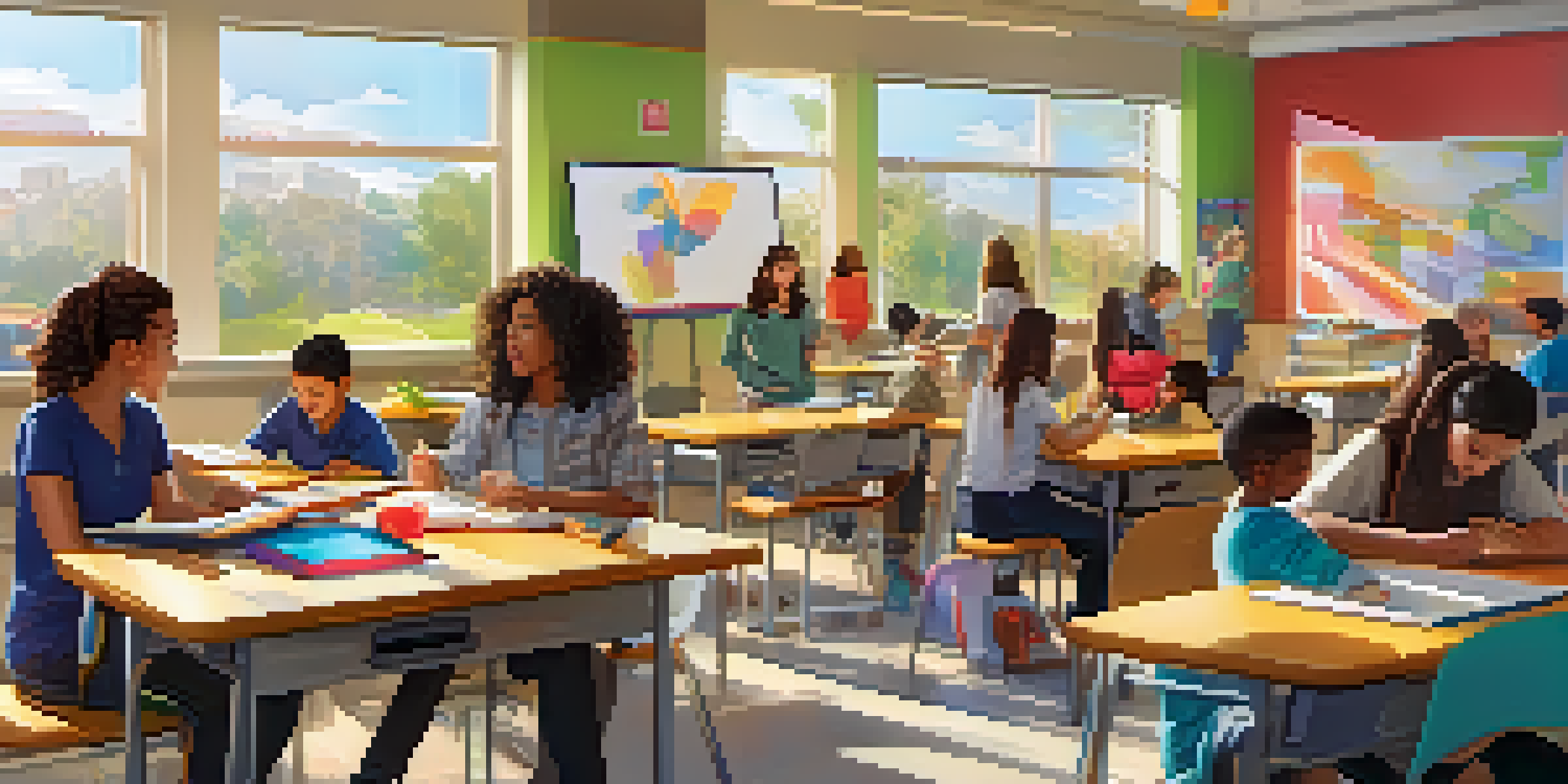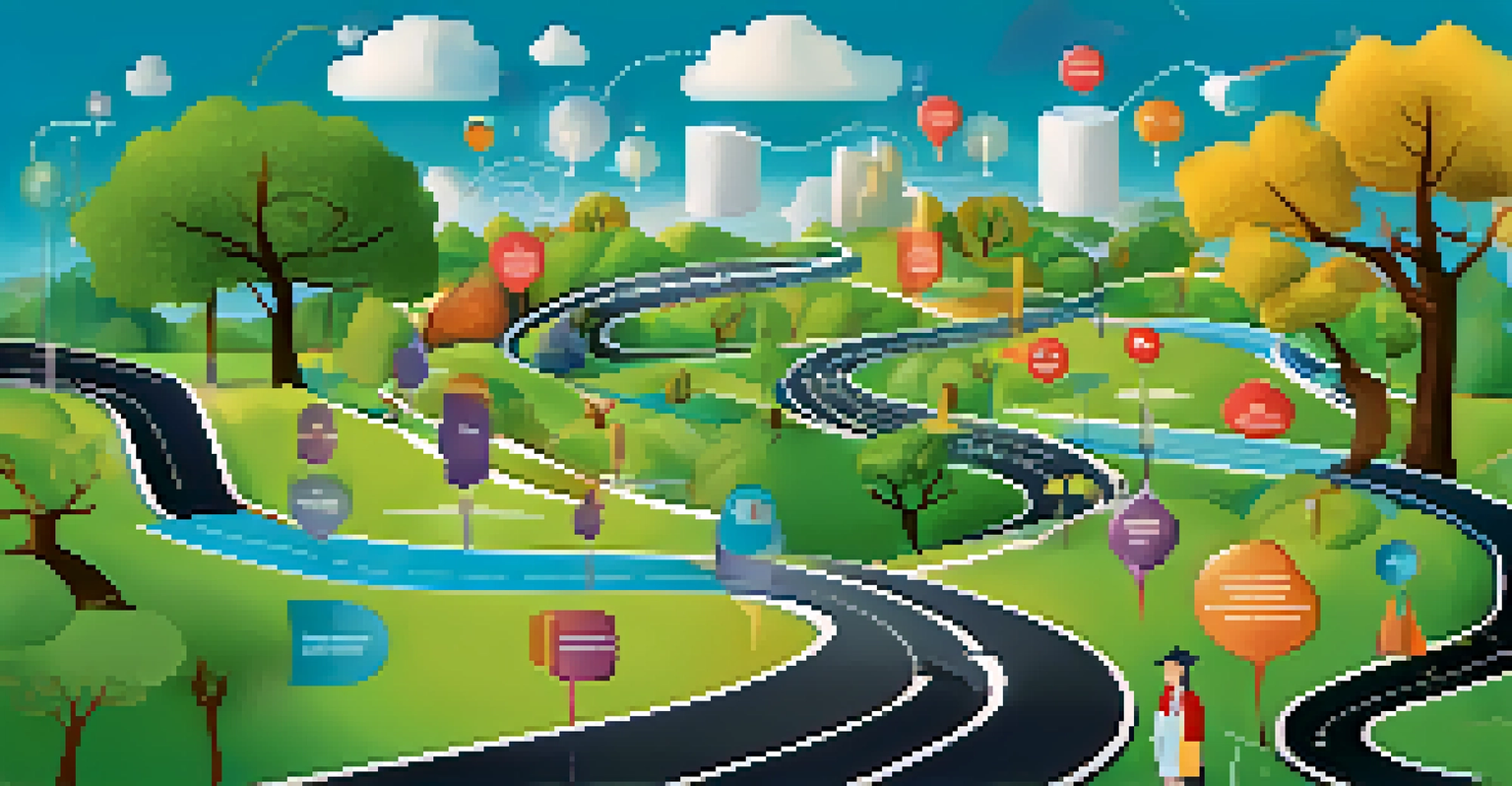Personalized Learning Paths Through Adaptive Learning Systems

Understanding Adaptive Learning Systems
Adaptive learning systems are educational technologies that tailor learning experiences to individual students' needs. Imagine having a personal tutor who knows your strengths and weaknesses, adjusting lessons in real-time to help you grasp concepts more effectively. These systems utilize data analytics and algorithms to understand how each learner interacts with the material, making education more personalized and engaging.
Personalized learning is a journey, not a destination.
The essence of adaptive learning lies in its ability to provide immediate feedback and support, allowing learners to progress at their own pace. For instance, if a student excels in math but struggles with reading comprehension, the system can adjust the curriculum accordingly. This not only boosts confidence but also ensures that no student is left behind in their learning journey.
By leveraging technology, adaptive learning systems facilitate a more dynamic learning environment. They promote self-directed learning, encouraging students to take ownership of their educational paths while providing the necessary resources and support. As a result, students are more likely to stay engaged and motivated throughout their learning experience.
Benefits of Personalized Learning Paths
Personalized learning paths offer a multitude of benefits that cater to individual learning styles and preferences. For example, visual learners might benefit from interactive videos, while auditory learners excel with podcasts or discussions. By providing a tailored approach, these systems enhance comprehension and retention of information, making learning more effective.

Moreover, personalized learning paths can significantly reduce frustration often associated with one-size-fits-all education. Students who struggle with certain subjects can receive targeted support, allowing them to build a solid foundation before moving on to more advanced topics. This not only fosters a positive learning experience but also encourages lifelong learning.
Personalized Learning Enhances Engagement
Adaptive learning systems tailor educational experiences to individual needs, fostering greater student engagement and motivation.
Additionally, personalized learning paths can lead to improved academic performance and higher engagement levels. When students feel that their unique needs are recognized and addressed, they are more likely to participate actively in their education. This sense of ownership can translate into better outcomes and a more fulfilling learning experience.
How Adaptive Learning Systems Analyze Data
Adaptive learning systems rely heavily on data analysis to create effective personalized learning paths. They gather information about each student's interactions, performance, and preferences throughout the learning process. This data is then used to fine-tune recommendations and adjust the curriculum to better suit the learner's needs.
The great aim of education is not knowledge but action.
For example, if a student consistently struggles with specific math problems, the system might identify patterns in their responses. It can then provide additional practice questions or resources that target those weak areas, helping the student improve over time. This analytical approach ensures that learning is not only personalized but also grounded in evidence.
Moreover, data analytics in adaptive learning systems can help educators track progress on a larger scale. By analyzing trends and outcomes across different students, teachers can identify which strategies are working and which need adjustment. This collective insight enhances the overall learning experience for all students.
The Role of Technology in Education
Technology plays a crucial role in the evolution of personalized learning paths through adaptive learning systems. With advancements in artificial intelligence and machine learning, educational tools can now process vast amounts of data to provide real-time insights. This allows for a more tailored educational experience that meets the diverse needs of learners.
Consider the accessibility of online resources; students can learn anytime, anywhere, using tools that cater to their learning preferences. Whether it's through gamified learning apps or interactive simulations, technology empowers students to explore subjects in ways that resonate with them. This flexibility is particularly beneficial in today's fast-paced world.
Data-Driven Insights Improve Learning
These systems utilize data analytics to identify student strengths and weaknesses, allowing for targeted support and improved academic performance.
Furthermore, technology fosters collaboration among students and educators. Online platforms enable communication and feedback, creating a supportive learning community. This connectivity enhances the learning experience and encourages students to share knowledge, leading to richer educational outcomes.
Challenges in Implementing Adaptive Learning Systems
While adaptive learning systems offer numerous advantages, there are challenges to consider when implementing them in educational settings. One major hurdle is the initial cost of technology and training necessary for educators to effectively use these systems. Schools may struggle to allocate funds for the tools and resources required to transition to a more personalized approach.
Another challenge is ensuring that all students have equal access to technology. In some areas, students may lack reliable internet access or devices, creating a digital divide that could exacerbate existing inequalities. Addressing these disparities is crucial for ensuring that personalized learning paths are truly accessible to everyone.
Additionally, educators must be trained to interpret data and utilize adaptive learning systems effectively. This requires ongoing professional development and support, which can be resource-intensive. However, overcoming these challenges is essential for realizing the full potential of personalized learning pathways.
Future Trends in Adaptive Learning
The future of adaptive learning systems is bright, with ongoing advancements in technology set to enhance personalized learning paths even further. Innovations in artificial intelligence are making it possible for these systems to become even more responsive to individual learning needs. This means a more seamless and effective learning experience for students.
Additionally, we can expect a greater emphasis on social and emotional learning (SEL) within adaptive learning systems. As educators recognize the importance of emotional intelligence in education, systems will likely incorporate elements that nurture students' social skills and emotional well-being. This holistic approach will lead to more well-rounded learners.
Technology Bridges Learning Gaps
Advancements in technology facilitate personalized learning paths, making education accessible and effective for diverse learners.
Moreover, collaboration between educational institutions and technology companies will likely drive the development of more sophisticated adaptive learning tools. By working together, they can create solutions that are not only effective but also scalable, ensuring that personalized learning paths can reach a wider audience.
Conclusion: Embracing Personalized Learning
In conclusion, personalized learning paths through adaptive learning systems represent a significant shift in education. By leveraging technology to tailor learning experiences, we can cater to the unique needs of each student, promoting greater engagement and success. It’s an exciting time in the world of education, as we move away from traditional methods towards more innovative approaches.
Embracing personalized learning means recognizing that every student has their own journey. With adaptive learning systems, we can ensure that each learner receives the support they need to thrive academically and personally. This commitment to individualized education is essential for preparing students for the challenges of the future.

Ultimately, as we continue to explore and implement adaptive learning systems, we must remain focused on the goal of fostering a love for learning. By putting students at the center of their educational experience, we can create a more inclusive and effective learning environment for everyone.